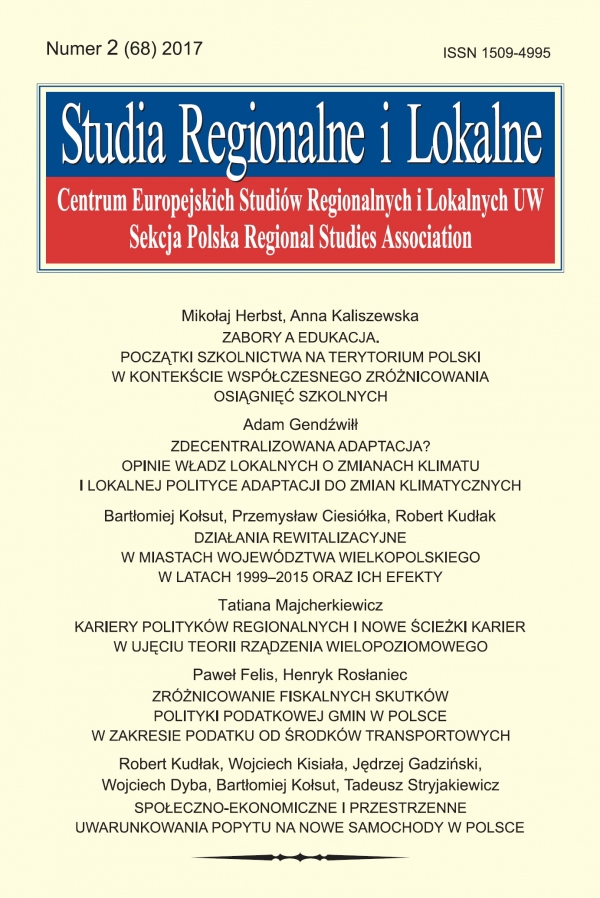Issue:
2(68)/2017
Mikołaj Herbst, Anna Kaliszewska
The partitions and education. The beginnings of education establishments on the
Polish territory in the context of today’s differentiation of academic achievement
DOI: 10.7366/150949956801
Zabory a edukacja. Początki szkolnictwa na terytorium Polski w kontekście współczesnego zróżnicowania osiągnięć szkolnych
Współczesne analizy osiągnięć edukacyjnych uczniów w różnych regionach Polski prowadzą do wniosku, że zróżnicowanie terytorialne wyników egzaminów jest po części następstwem odmienności kulturowych i nie da się w pełni wyjaśnić nierównymi nakładami na szkolnictwo ani reprodukcją kapitału ludzkiego między pokoleniami. Celem niniejszego artykułu jest lepsze zrozumienie tego zjawiska dzięki analizie instytucjonalnych aspektów systemu oświaty na ziemiach polskich w okresie jego formowania się w ramach trzech państw zaborczych. Z zawartych w nim rozważań wynika, że zasadnicza różnica między edukacją w Galicji, Kongresówce i zaborze pruskim odnosi się do stopnia społecznej akceptacji szkoły, statusu nauczyciela i roli edukacji jako dźwigni społecznego awansu. Zwrócono także uwagę na dwoiste traktowanie edukacji: w kategoriach nabywania praktycznych umiejętności albo formowania osobowości. Pod tym względem występowała wyraźna różnica między Galicją, gdzie program szkolny oferował przede wszystkim wychowanie humanistyczne, a pozostałymi zaborami, zwłaszcza pruskim, gdzie ściślejsze były związki między edukacją a gospodarką.
The partitions and education. The beginnings of education establishments on the
Polish territory in the context of today’s differentiation of academic achievement
Many authors claim that regional differences in average student achievements in Poland are partly determined by the cultural factors and cannot be fully explained by uneven spending on education or by reproduction of human capital between generations. The aim of this article is to better understand this phenomenon by studying the institutional aspects of Poland’s education system during its formation back in the 19th century, when Poland remained partitioned between the three empires: Prussian, Russian, and Austrian. It turns out that one fundamental difference between the early education system under the Austrian, Russian, and Prussian rule may concern the degree of social acceptance of the school, teacher status, and the role of education as a lever of social advancement. Another important factor is the perception of educational goals either in terms of acquisition of practical skills, or of personal formation. In this respect, there was a clear difference between Galicia (Austrian partition), where the curriculum was focused on the humanities, and other partitions (particularly Prussia), where schools were more linked to the economy.
Affiliation:
Mikołaj Herbst: Uniwersytet Warszawski, Centrum Europejskich Studiów Regionalnych i Lokalnych (EUROREG), ul. Krakowskie Przedmieście 30, 00-927 Warszawa, oraz Instytut Badań Edukacyjnych;
mherbst@uw.edu.pl Anna Kaliszewska: Uniwersytet Warszawski, Instytut Historyczny, Zakład Historii Nowożytnej, ul. Krakowskie Przedmieście 26/28, 00-927 Warszawa;
anikaliszewska@gmail.com 


